"The world thinks we're making Titanfall 3 and we're not - this is what we're making."
Respawn talks Apex Legends, its titan-less Titanfall battle royale.
Surprise! It's now official: Respawn's been quietly working on a free-to-play, first person shooter battle royale called Apex Legends - and it's already available for players to download.
Although many of the game's details have been splashed across the internet, there's still plenty here to discuss: including how the game actually plays, monetisation, and what this means for the Titanfall franchise. At a closed-doors event last week, I was able to trial Apex Legends for a full six hours, and ask Respawn a number of questions about its decision to go full battle royale.
First, the key details.
As Respawn is eager to reiterate, this is a battle royale set within the Titanfall universe rather than a Titanfall 2 sequel. It takes place about 30 years after the events of Titanfall 2, in an area called the Outlands, featuring an eclectic bunch of characters who are all competing in "the Titanfall equivalent of a blood sport". Hunger Games, but more sci-fi.
To be crowned champion, you'll need to lead your 3-player squad to victory against 19 other teams - a total of 57 other players. Finally, my chances of winning have increased.
It's essentially a genre-merge of battle royale and hero-based shooter. There are currently eight "legends" in the game, each with unique passive, tactical and ultimate abilities - but Respawn has gone to significant lengths to ensure the gameplay feels balanced. Apex Legends also introduces a variety of other neat additions to the battle royale genre. More on that later.
As leaked, Apex Legends is available on PC, PS4 and Xbox One. Lead producer Drew McCoy told me that while Respawn would love to bring Apex Legends to mobile and Switch, there's "nothing [they] can currently talk about", so you'll have to dock that handheld for now.
Although cross-play is unavailable at launch, Respawn told Eurogamer it "plans to allow players to play with their friends on other platforms". Cross-progress and cross-purchases, however, will never be possible in Apex Legends, "due to the way systems were set up early on" which "can't [be] reconciled after the fact". In other words, as cross-play only recently became a possibility, it will never be fully integrated into Apex Legends.
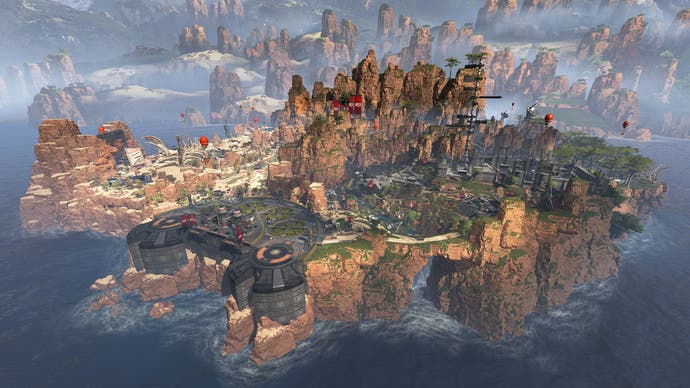
So those are the main facts - but why did we only hear about Apex Legends at the last possible minute before launch?
"Our desire is to be completely open and transparent with our player base, and part of that expands to how we talk about problems, and we understand this game is gonna have a sceptical audience," McCoy told me.
"There are some people who think there are too many battle royale games or it's a fad, the world thinks we're making Titanfall 3 and we're not - this is what we're making.
"To try and convince a sceptical audience for months with trailers and hands-on articles, we're just like 'let the game speak for itself' - it's the most powerful antidote to potential problems.
"We're doing a free to play game, with essentially loot boxes, after we were bought by EA, and it's not Titanfall 3. It's the perfect recipe for a marketing plan to go awry, so why have that - let's just ship the game and let players play."
It's a surprisingly open response. But then, in the context of what happened with Star Wars: Battlefront 2, Apex Legends' release with the bare minimum of marketing makes sense. Respawn simply want the game to speak for itself, McCoy says.
McCoy's answer also confirms what many already suspected: Titanfall 3 isn't in development, and Apex Legends is its current Titanfall focus. (Respawn is also working on Jedi: Fallen Order, an under-wraps Star Wars game it briefly announced last year.)
Back in fall 2017, a Respawn source told Kotaku's Jason Schreier "Titanfall 3 was well into development" and would release by the end of 2018. The reason for the hurry was that the modified version of Valve's Source engine (used by the previous Titanfall games and reportedly also Apex Legends) - "was starting to feel dated", and "Titanfall 3 might not feel or look as good if it came out too much later" - which, clearly, it did not.
This fits with what McCoy explained to me: that progress towards Apex Legends began after Titanfall 2, when the developer experimented with battle royale, "decided this wasn't going to be a mode", and chose to make Apex Legends "a game on its own". It certainly feels like Apex Legends could have been a battle royale mode for Titanfall 3.
And, as Respawn is committed to building Apex Legends as a "proper live service game", it could be some time before we see a true sequel to Titanfall 2 - if indeed one is still on the cards.
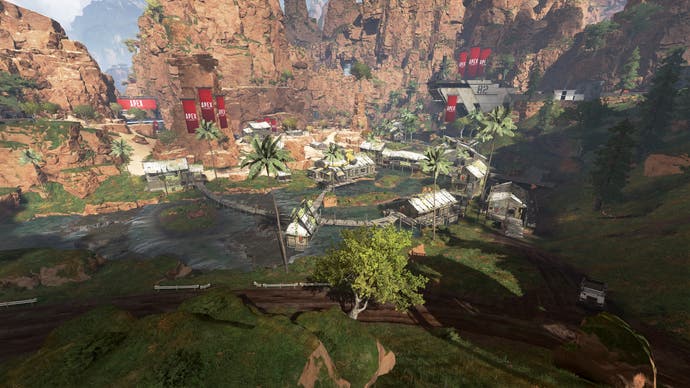
This also means a long break from some of Titanfall's most iconic features, including titans and mobility mechanics like wall-running and double jumping. Although these features appeared in prototypes of Apex Legends, none made the final cut - and with good reason, McCoy explains.
"When we started [Apex Legends] we were building off Titanfall 2, and we didn't know we weren't going to have double jump or wall running or titans," he tells me. "The choice to not have those came about because of play-testing against our goals: to have a strategic, learnable, masterable, deep game.
"[We had] things like wall running and double jumping for a long time, we had triple jump for a while, they make combat really hard to beat and comprehend. You can't predict where players come from or you're pushing them to, and things would happen to you more than you would predict and respond against. So it's really fun to do, but it's really bad for combat legibility."
According to McCoy, the absence of titans is similarly due to a difference in goals between the core Titanfall games and the new battle royale.
"The titans in Titanfall 1 and 2 were meant to be a power fantasy - you're supposed to think 'alright, I can call it in, I can power it up and feel like a bad-ass for a little while', then it'll probably blow up and you have a chance to do it again.
"So we were prototyping that and they were a power-up, and that was really detrimental to a battle royale. Battle royales are supposed to be like Poker - everyone comes to the table with the same possibilities."
"If we ever balanced a titan down to where they were not a destructive force on the match - it was like betraying that power fantasy, like they were made out of paper, a wet cardboard bag - it was not worth it."
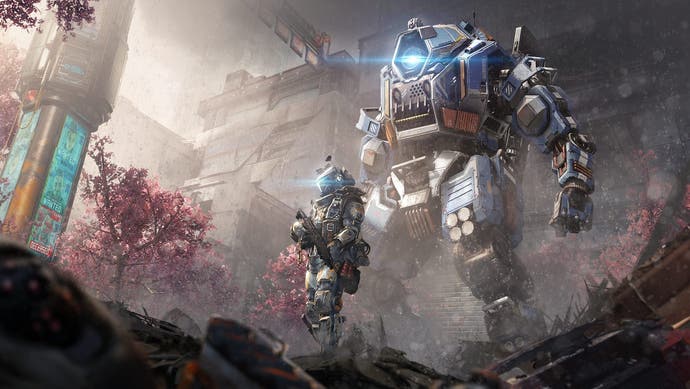
A power fantasy in a soggy bag? Yep, that sounds like the wet dream nobody wants. But if Apex Legends doesn't have titans, why set it in the Titanfall universe at all? According to McCoy, the answer to this lies in Respawn's desire to flesh out the Titanfall universe.
"We were actually looking to find ways to tell more stories within Titanfall - the fight between the IMC and militias is pretty binary, pretty black and white - and what's really exciting is to think of it more in a grey area: what does the wild west of the Titanfall universe look like?
"With these sometimes nasty characters, what are they like? Caustic is a great example - he's like a Saturday morning cartoon villain, he's not a real real bad guy, but he's deliciously evil - and getting more of those types of characters that span the range. So for us it's really about finding more ways to add depth to this world."

Although Apex Legends certainly introduces more colourful characters than the previous Titanfall games (perhaps not a difficult feat), I wasn't 100 per cent sold on the character designs. Many of them feel heavily influenced by Borderlands - a little too heavily - while the dialogue wavers between grating and unremarkable. In comparison to past class-based shooters like Team Fortress 2, Apex Legends' characters don't have the same strong aesthetic, sense of humour, or cohesive whole. The cosmetic skins, meanwhile, only get interesting at the legendary item level: which doesn't compare well to the sort of goodies Fortnite is pumping out on a regular basis.
Respawn should, however, be commended for the diversity of the cast: it's refreshing to see a line-up featuring such a mix of backgrounds.
And while the characters themselves are underwhelming, their abilities do bring something new to the table. After six hours of playtime, I felt like I barely scratched the surface with each character. Some ultimate abilities feel more OP than others - particularly if you compare Gibraltar's powerful orbital strike to Wraith's (very situational) portals - but there's potential here for interesting squad builds, ability combinations and tactical teamwork.
I was also surprised to see that - despite this being a hero shooter - the classes felt fairly balanced. It's still early days, but Apex Legends looks like it will provide some interesting end-game metas: ones that don't involve building, hallelujah.
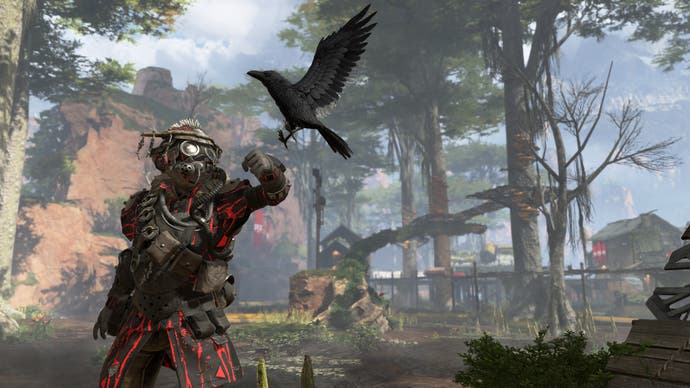
Another topic that came up in interview is that Respawn has spent a lot of time tweaking and improving the battle royale format, or as McCoy termed it, trying to "solve the sins of battle royale".
"It's done amazing things for shooters, but it has problems - even those who love it have issues with certain things," McCoy added.
This was something I noticed during my own time with the game. Apex Legends' drop - while occasionally feeling a little clunky - helps squads land together thanks to the addition of a "jumpmaster". This gives one player the power to control the direction of landing, but other players can peel off early if they wish. In theory it should prevent that one annoying squadmate from vanishing into the distance too early. In theory.
Another stand-out feature, surprisingly, is Apex Legends' communication system - or "ping" system as Respawn has termed it. With a simple click on your mouse wheel or controller bumper, you can easily flag up points of interest on the map: be it enemies, weapons or locations - and communicate these to your teammates. Along with audio cues, items are displayed with a tiny image to show what they are. A subtle but sweet feature is the ability to say thanks if you pick up an item flagged by a teammate. It's an intelligently-designed system to aid closer squad cooperation: although I did find one of my squadmates was a little over-zealous in flagging literally every item. Hopefully there's also a mute option for this.
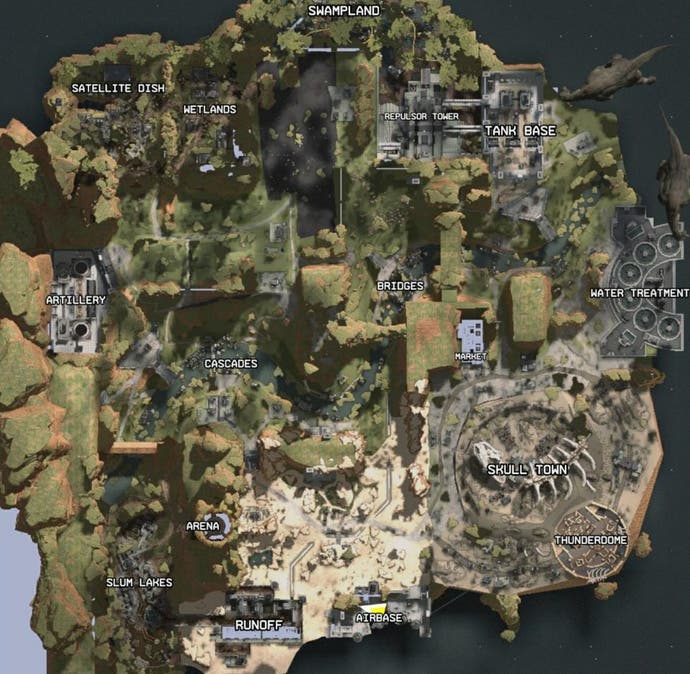
Mobility and pacing is another frequent issue in battle royales - but I found Apex Legends hits a nice middle ground between frantic and slow. The map (despite its uninspired naming decisions) seems to prevent excessive third-partying or long-distance sniping with its furrowed design, while areas such as the Endor-like Swamplands provide verticality, and bunkers give players more traditional Titanfall close-quarters combat. Thanks to ziplines, audio prompts from the characters and balloons (jump towers) which allow you to re-deploy, I never found myself inadvertently caught out by the circle - a common frustration in most battle royales.
In a press release for the game, McCoy said the Respawn's aim for every match was "you come in with a plan but you leave with a story". That, for me, is the core experience of a battle royale squad game: not whether you win, but the ridiculous story leading up to either victory or (more likely) death.
This is something Respawn clearly understands, as along with the focus on squad communication, the studio has added a new feature called "Respawn Beacons". Aside from being an excuse to plug the studio's name, these provide an opportunity for players to revive dead teammates: simply retrieve a tag from your squadmate's body, and return it to a marked respawn spot.
Not only does this give squadmates a second chance - and a reason to stick around in spectator mode - but it adds another chapter to the story of each battle royale match. When two of my teammates were killed, I found myself embarking on a rescue mission - highly exposed as I was - to revive these players as quickly as possible. Once they rejoined me, I then changed to the role of bodyguard as my two new-born teammates scurried around searching for weapons. A few minutes later, I was killed - but one of my squadmates eventually won the game. The whole episode added another layer of story to the match, and made the game more memorable as a result.
An area over which I have more mixed feelings is the game's monetisation system. While Respawn describes its four monetisation systems as being driven by a "player's choice" mentality, it does feel a little like throwing everything at the wall to see what sticks. There's a battle pass, loot boxes (of a sort), a Fortnite-style item shop, and purchasable "legends" such as Mirage and Caustic - which are not instantly playable in the game and must be unlocked. There are also three types of in-game currency: legend tokens, Apex coins and crafting metals, all of which are earned in different ways and unlock different things. It feels messy.
Beyond this, the monetisation system does seem to avoid the pitfalls of previous free-to-play games. Loot boxes (Apex Packs) are cosmetic-only, guarantee a rare or better item, avoid duplicates, and have "bad luck detection against opening too many before [a player] hits a legendary item". None of the items will be exclusive to the paid loot boxes, pack odds will be published online, and the packs can also be earned through playing the game - although it was hard to judge the exact amount you get via grinding.
A point worth noting is that all legends added in future are going to be locked. While the new legends won't offer a gameplay advantage, the alternative gameplay methods provided will need to be unlocked - either through play, or by fast-tracking with money.
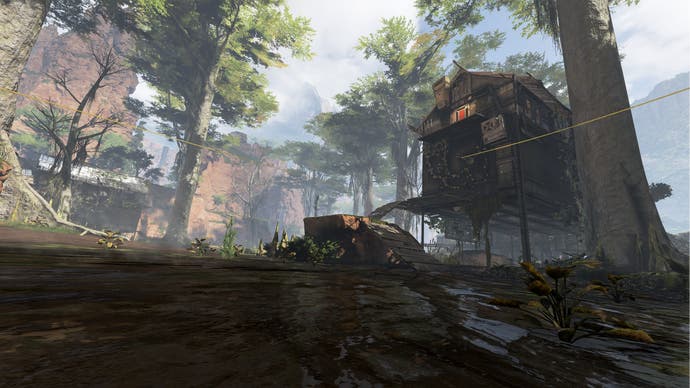
Apex Legends doesn't have the most distinctive art style, but it more than makes up for this in gameplay. It took me a while to get to grips with the items and abilities - perhaps a little too long - but Apex Legends feels intelligently designed, and promises a unique approach to the battle royale genre. It's not perfect, and while it doesn't have the famous mechs or wall-running of its Titanfall cousins, both the gameplay and map feel well designed and engaging.
Over the weekend I found myself wanting to play Apex Legends with my friends - then remembering the game wasn't even out yet. But it is now - and I look forward to hearing their pers-pextives on this one.
This article is based on a press trip to the US. EA covered travel and accommodation costs.
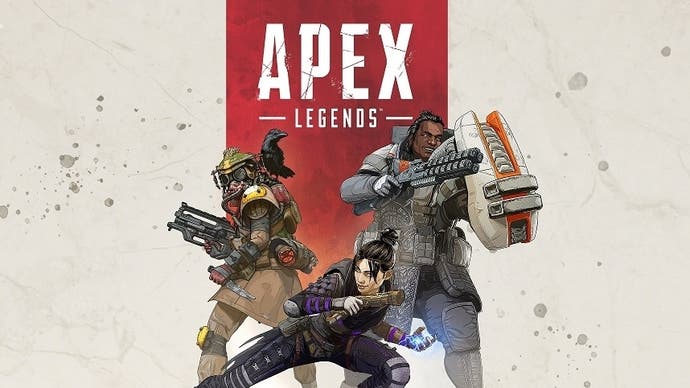







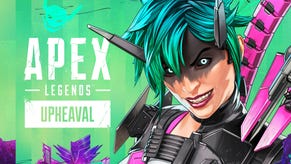
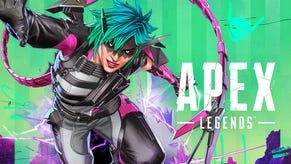

.png?width=291&height=164&fit=crop&quality=80&format=jpg&auto=webp)